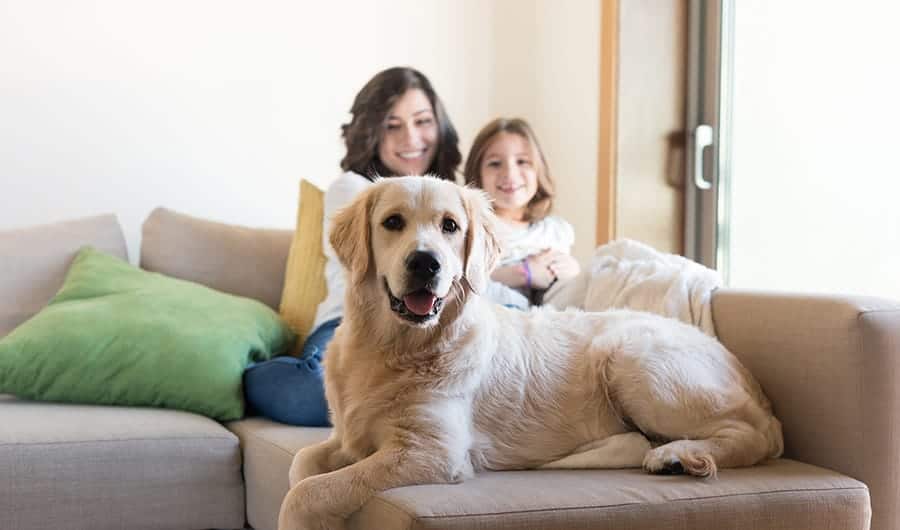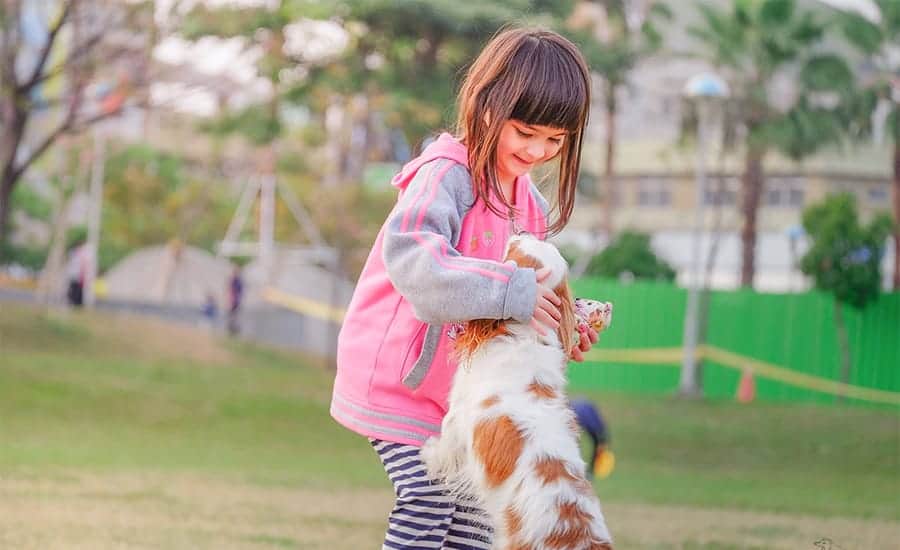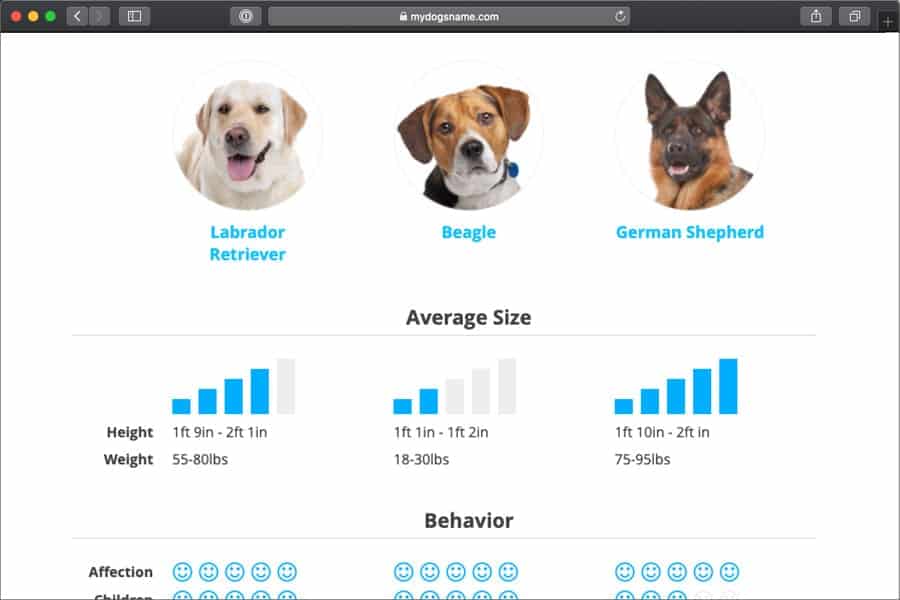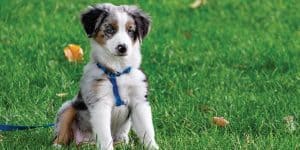What Dog Should I Get?
Published: Last updated: by Jessi LarsonMany people ask, “What dog should I get?” because there are so many options. Is there a pup that is perfectly matched to you? Let’s find out!
Some people go in knowing exactly what type of dog they want. For instance, their family has always had Vislas so they know that’s the dog breed for them. We’ve always had Labs and love their goofy sweet personalities.

For others, it’s not such an obvious decision. Maybe you’ve had multiple breeds, never had a dog, or just want to see what options are available.
So when we hear, “What dog should I get?!?” We like to dive into your specific situation. Starting with:
Your Home
Our homes obviously have an impact on what dog breeds work well. Smaller spaces, like apartments or townhouses, limit the size of dog you can get. Homes like these also might have restrictions on pet sizes and breeds. Make sure you check first.
If you’re living in a close space, you’ll also want to consider a dog that doesn’t bark too much. A high-energy dog will need a lot of walking & play. If you get one of these dogs, do you have a place in mind to wear your dog out?
If you have a single-family home, your options are more open. But, don’t forget about the yard. Some breeds need extra space outside to play and get exercise. And some will benefit from a fenced-in yard or an invisible fence.
Also, think about the climate. If you’re in an intense climate – either super hot or very cold – pick a breed that does well in those conditions.
Your Family
The next step is to think about who your dog will be sharing a home with. Do you have other pets? If you have another dog, you’ll have to pick a breed that gets along well your existing pup. Or if you have a cat (or cats), it’s imperative to get a breed of dog that won’t antagonize your poor kitty.

If you’re going to adopt a dog, you’ll find that some dogs are recommended for living with other pets and others aren’t. Watch out for this, as it’s important to make sure your new pup can integrate well.
Think about your human counterparts. A skittish, fragile dog won’t work if you have young kids. You need a breed that’s patient and durable. Additionally, think about how much time and energy you have. For busy people, an independent dog may be a better fit. And if you have health limitations, a hyperactive breed that needs a lot of exercise is tough – try one that’s more on the mellow side.
Last but not least, consider the health needs of your household. If someone in your family has allergies, get a hypoallergenic breed, like a Maltese, Poodle, Bichon Frise, Schnauzer or Portuguese Water Dog.
When you go to look at new dogs, have your family come along. It’s a great idea to see how everyone gets along before making a long-term decision.
Your Lifestyle
When you say to yourself, “What dog should I get?”, make sure you honestly evaluate your lifestyle.
Certain breeds are more expensive than others. How much money do you have (or are willing) to commit to your dog? Fancy, in-demand breeds like the English Bulldog come with hefty upfront price tags ($500 – $1000+). Others, like the Great Dane, are prone to numerous health issues. Do your research before committing.
You’ll also have ongoing food and boarding expenses to consider. If you get a large dog, they’re going to go through more food. Also if you’re away for long periods of time (travel or vacations without your dog) you’ll need to have someone take care of them. If you don’t have family or friends to do this you’ll have to pay for boarding ($25-$60/night).
It’s estimated that the cost of dog ownership is around $1000-1500 the first year and $500-$1000 each additional year.
Your Energy Level
How much energy do you have to give to your dog? At a basic level, you’ll need to walk your dog to give it some exercise. For a small dog, this can be a walk around the block. For a more energetic dog, they’ll need to be worn out (a good dog is a tired dog!). If you’re a runner or like to go on hikes, you can pick a high-energy dog that accompanies you in these endeavors. Otherwise, consider longer walks, or heading to the dog park.
We were taking our Lab Toby on multiple walks or dog park runs per day as a puppy. Now that he’s a bit older he’s good with a nice long walk plus a trip to the park or some fetch. It’s a lot of work!
Are you interested in hunting or training dogs to catch frisbees or run on a course? There are specific breeds that are built for this type of high-energy or focused work.
Choosing a Dog Breed

The question of “What dog should I get?” is not an easy one. That’s why we added a new dog breed selector to our site. The goal is to perfectly match potential pet owners with a dog breed that fits their lifestyle and needs.
To get started, users select what’s important to them in a dog – size, activity level, and how well they get along with pets, kids and others – as well as info about their home and climate. The tool then generates a list of the best-fitting breeds, which can be sorted by popularity, grooming needs, training ability, and more.
The breed selector pulls from a list of all 184 AKC breeds. To help evaluate options, the site offers an easy comparison tool to look at the breed differences side by side. Breed stats are represented in a fun, graphical way, too!
Check out the DOG BREED SELECTOR!
Finding a canine friend who complements your lifestyle and will thrive in your home is important. Take the time to do your due diligence upfront, and you’ll have a happy dog for life.
Buying a Dog
Now that you’ve answered the question of “what dog should I get?” and found some breeds that fit your lifestyle. Next, it’s time to start searching.
There are 3 main places to get a dog:
- Adopting from a shelter
- Buying from a breeder
- Buying from a store
We recommend you either adopt your dog from a shelter or buy it from a breeder. Most stores purchase their dogs cheaply from a puppy mill that churns out low-quality dogs to try and earn a profit. The saddest thing about this is many of these dogs don’t sell and they are sent away to a shelter or killed. It’s best not to encourage this practice.
One exception to this is pet stores that will have dog adoption charities come in with some of their dogs for an in-store visit. These are usually listed ahead of time and only on specific days. This is good exposure for these organizations and a safe way to find your new pup.
Adopting a Dog
If you’re adopting a dog you’ll find a wide range of options that are constantly changing. You can find:
- Puppies
- Mid/older-aged dogs – these dogs are often easier to care for being passed their puppy stage and sometimes even come with some training.
- Needy dogs – some dogs were raised wild or had problem owners. These dogs need a loving owner who is willing to help them out. The shelter will explain their situation. Often they just need some extra attention and are just as easy as any other dog. Occasionally, they may have some issues such as being fearful and won’t do as well with children or other pets.
Buying a Dog from a Breeder
If you’re buying from a breeder you’ll find both:
- Families who have decided to breed their dogs, but not keep all of the puppies. This is how we got our dog Toby.
- Professional breeders who are focused on a particular dog breed and strong genetics.
A breeder will generally be more expensive and often have papers with specific information about the dog’s breed. Make sure you’re buying from a quality breeder that cares for its animals.
Sources for Dogs:
- http://www.adoptapet.com/ – search shelters & rescues
- https://www.petfinder.com/ – find pets to adopt
- http://www.aspca.org/adopt-pet/adoptable-dogs-your-local-shelter
- https://www.allpaws.com/



 Getting a New Dog?
Getting a New Dog?
2 Comments
Thanks for the article. I’d like to add that I live in an apartment complex and I feel so bad for all the bigger breeds of dogs that live there. They are so crammed in the small space. I also have a few smaller breed dogs in the complex that won’t stop barking. Apartment residents please choose a smaller dog and train so it doesn’t bark. You’ll do your neighbors a big favor!
Great post! It’s really important to research about dog breeds to make sure you get one that fits you lifestyle. Thanks for sharing!